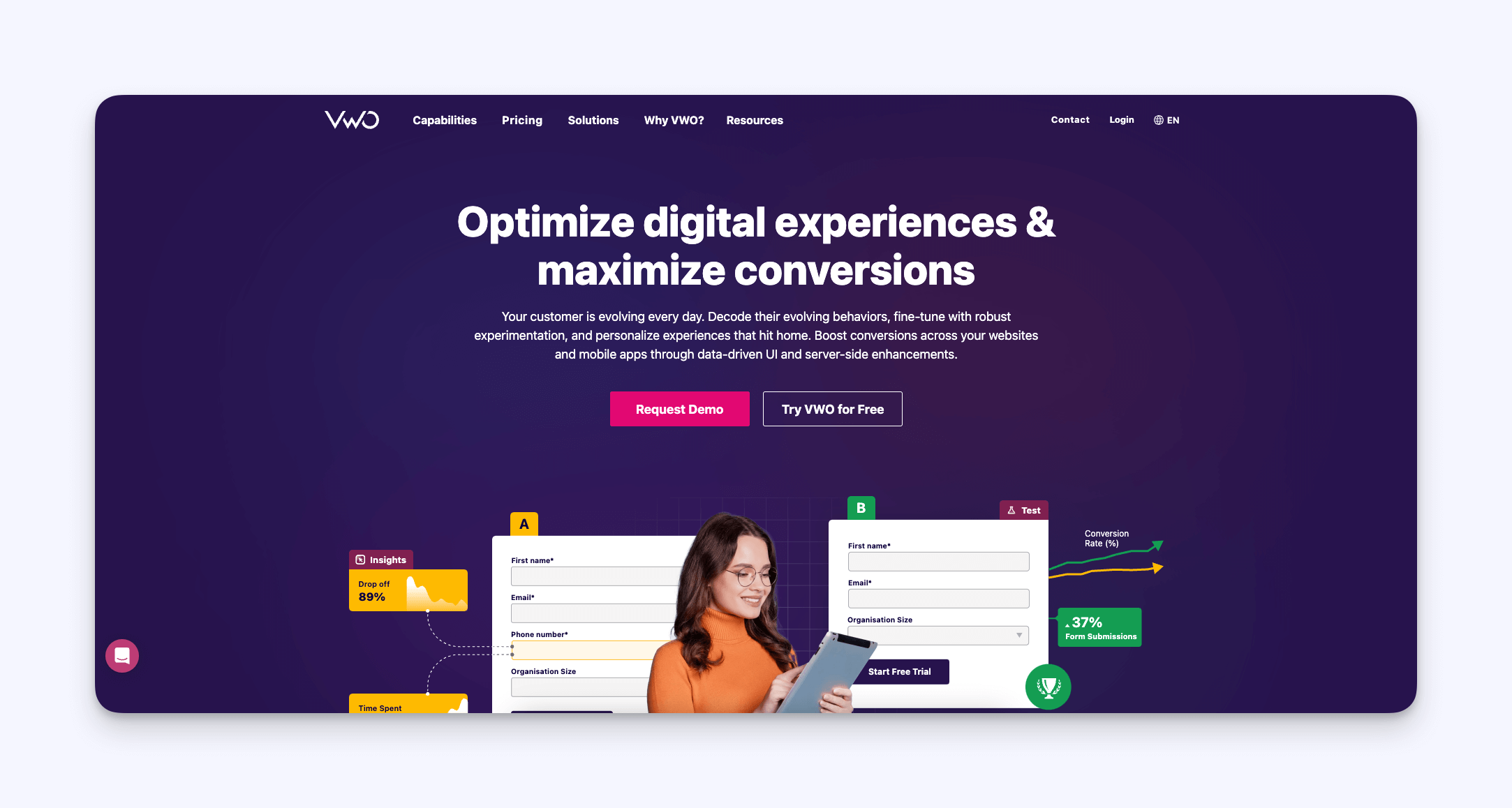
A/B Testing
Optimizing for Real Business Impact: A Strategic Framework for Ecommerce Experimentation
Learn more

Optimizely offers a powerful suite of experimentation and personalization tools, but it might not be the perfect fit for everyone.
With its enterprise-level pricing and sometimes complex setup, businesses of all sizes are exploring other options within the growing feature management platform market.
In this article, we'll analyze the top eight Optimizely alternatives, providing an in-depth comparison to help you find the solution that best aligns with your specific business needs.
Here’s a quick look at Optimizely’s top competitors:
Optimizely is a Digital Experience Platform (DXP) designed to empower marketing teams to run their own website experiments. It works as a centralized hub, offering a complete suite of marketing tools like a CMS and marketing orchestration tools. It also includes products for the following key functionalities:
Here’s three reasons why you might want to look for Optimizely competitors:

Eppo is an experimentation and feature management platform that stands out as the best Optimizely alternative. Its key differentiator is that it’s warehouse native, which means Eppo runs queries on your database without any need to rebuild metrics or hunt down and diagnose discrepancies.
Instead of relying on a javascript snippet which by definition can only access top-level website metrics, Eppo can access your revenue, profit margins, and customer retention rates so the experiments you run are risk-free and based on real, hard data from your company’s centralized source of truth.
You can run various kinds of experiments, ranging from simple A/B tests to advanced multi-armed bandit algorithms across different parts of your technology stack.
Most importantly, Eppo’s core principle is to enable experimentation at scale – meaning that experimentation is viewed as an ongoing process. Constant testing and refining of new features means businesses can improve their most important metrics, discover unintuitive innovations and create a continuous, upward trajectory – rather than rely on a series of one-off, isolated experiments.
This last point is supported by a strong feature flagging system. This system allows for a wide range of controls, from basic on/off toggles to complex traffic distribution.
Features
How does it compare to Optimizely?
Eppo stands out from Optimizely by connecting directly to your data warehouse. Instead of using a javascript snippet to capture data from a site like Optimizely, Eppo does it natively, using queries just like your data team would.
This seemingly-simple difference means Eppo has access to every aspect of your business for experimentation, boasts a straight-forward setup process and allows you to centralize your your organization’s entire experiment roster in one place.
Eppo's focus on experimentation and its advanced feature flags make it easy to test continuously, unlike Optimizely which is often described as overly complex for long-term continuous testing.
Pricing

Convert.com is an A/B testing platform designed to help businesses improve their digital experiences across websites and applications. It positions itself as a strong alternative to enterprise-level solutions such as Optimizely, offering similar core product features at a more competitive price point.
However, it’s important to mention that Convert.com lacks the scale to work with enterprise-level companies and it doesn’t offer the type of customer and sales support required for customers of such caliber.
Features
How does it compare to Optimizely?
Convert.com offers similar features to Optimizely but stands out with its significantly lower pricing (especially for higher user volumes), excellent reporting visualizations, streamlined previewing, and minimal impact on website speed.
Pricing
Basic plan: $349/month (annually) — 200K tester users
Growth plan: $699/month (annually) — 500K tester users
Expert plan: $1,119/month (annually) — 1M tester users
Enterprise plan: On request.

AB Tasty is a “customer experience optimization” platform that empowers teams to craft data-driven business strategies through experimentation, personalization, and exploratory new AI features.
It attempts to use AI to act as a strategic advisor to businesses, helping them gather customer insights and suggesting high-impact A/B test variations or audience segments.
Features
How does it compare to Optimizely?
AB Tasty stands out from Optimizely by providing greater pricing variety, compatibility with a wider range of platforms, refined audience targeting tools, and exploratory AI features. As a European company, they may also offer better compliance with GDPR.
Pricing
On request.

As one of the original vendors in the A/B testing software space, VWO is an experimentation platform for optimizing websites, mobile apps, and various digital experiences. It empowers businesses of all sizes with tools for A/B testing, personalization, and in-depth analysis.
Features
How does it compare to Optimizely?
VWO sets itself apart from Optimizely by offering a wider array of non-experimentation capabilities. This includes options like heatmaps, surveys, and other marketing planning tools.
VWO’s India-based team also provides hands-on services to support your CRO strategy and execution, making it a strong choice for businesses wanting additional assistance.
Pricing
VWO’s pricing is based on Monthly Tracked Users (MTU). It has a free version for businesses with under 10k unique visitors, but its most complete features are gated behind higher plans which cost over $422 for 10k MTU.

Crazy Egg is a website visualization tool that reveals how visitors interact with your site. It uses heatmaps to track clicks, scrolling behavior, and other engagement metrics.
This, along with in-depth data analysis, provides actionable insights for improving your website's design and content through experimentation with A/B testing.
Features
How does it compare to Optimizely?
Crazy Egg offers a small point solution for website improvement compared to Optimizely's broader feature set.
It's particularly strong for uncovering the "why" behind user behavior with its data visualization tools. Crazy Egg's lower price point makes it accessible for businesses of all sizes, unlike Optimizely’s enterprise-focused model.
Pricing
Standard plan: $49 / per month
Plus plan: $99 / per month
Enterprise plan: $249 / per month
Important: All plans include a free 30-day trial and are billed annually.

Dynamic Yield is a pioneering Customer Experience Optimization (CXO) platform. Once owned by McDonalds (really!), it focuses on crafting personalized customer experiences across various channels like websites, mobile apps, and email.
For those considering it as an alternative to Optimizely, It offers robust tools for website A/B testing and tailoring content, recommendations, and offers based on user behavior.
Since its acquisition by Mastercard, Dynamic Yield has become more specialized, focusing heavily on testing and personalization for the financial services industry. If you operate in this sector, its insights and tailored solutions could prove valuable. However, the need for egressing data to Dynamic Yield means it may not meet your security needs compared to a warehouse-native platform like Eppo, which requires zero egress of data to third parties.
Features
How does it compare to Optimizely?
Unlike Optimizely, which focuses primarily on website optimization, Dynamic Yield offers a broader personalization toolkit.This is why it was temporarily owned by McDonalds, who hoped to use it to personalize digital menu and drivethrough experiences in their stores. It extends beyond the website experience to potentially include email, push notifications, SMS, and other communication channels.
Pricing
On request.

Amplitude Experiment is an A/B testing and feature flagging solution that is part of the full Amplitude analytics suite of tools. By leveraging the power of Amplitude’s data collection, it helps run targeted experiments and inform future product updates with live customer data.
Features
How does it compare to Optimizely?
For those willing to make the jump from Optimizely to the Amplitude platform, Amplitude Experiment offers the advantage of testing changes directly within your existing analytics framework.
The key advantage over Optimizely here is that this speeds up workflows, eliminating the need to manage results across separate platforms and providing a unified view of the data from the company’s experimentation efforts.
For teams not already using the full suite of Amplitude’s product analytics solutions, however, it makes little sense as a standalone tool.
Pricing
On request.

OptiMonk is a conversion rate optimization (CRO) platform specializing in on-site popups, notification bars, and other lead capture tools. It aims to increase website engagement and conversions with personalized messaging, behavioral targeting, and A/B testing capabilities.
Since it’s primarily geared towards e-commerce, OptiMonk also provides solutions for publishers and lead generation websites. It is most similar to Crazy Egg in its focus on a small point solution for running A/B tests vs. a fully-fledged experimentation platform.
Features
How does it compare to Optimizely?
OptiMonk is a compelling Optimizely alternative if your focus is solely on lead acquisition for eCommerce due to its affordability and numerous campaign options.
Unlike Optimizely, which focuses primarily on A/B testing tools, OptiMonk provides out-of-the-box support for common eCommerce elements (popups, side messages, sticky bars, etc.), trading off flexilibility and the full range of use cases for minimal technical expertise required.
Pricing
There’s a free plan, but for more features, the plans go as follows:
Selecting the best Optimizely alternative to suit your specific needs can feel overwhelming. Here are some pointers to help you narrow down the field, depending on your needs:
Now that you've explored your Optimizely alternative options, you're well-equipped to make the best decision for your business.
If you're looking for a solution that prioritizes revenue growth and customer retention through experimentation, Eppo stands out as a compelling choice.
Eppo's approach to experimentation sets it apart. It's designed to directly impact your bottom line with a complete toolkit for:
Ready to see how Eppo can make a difference?





